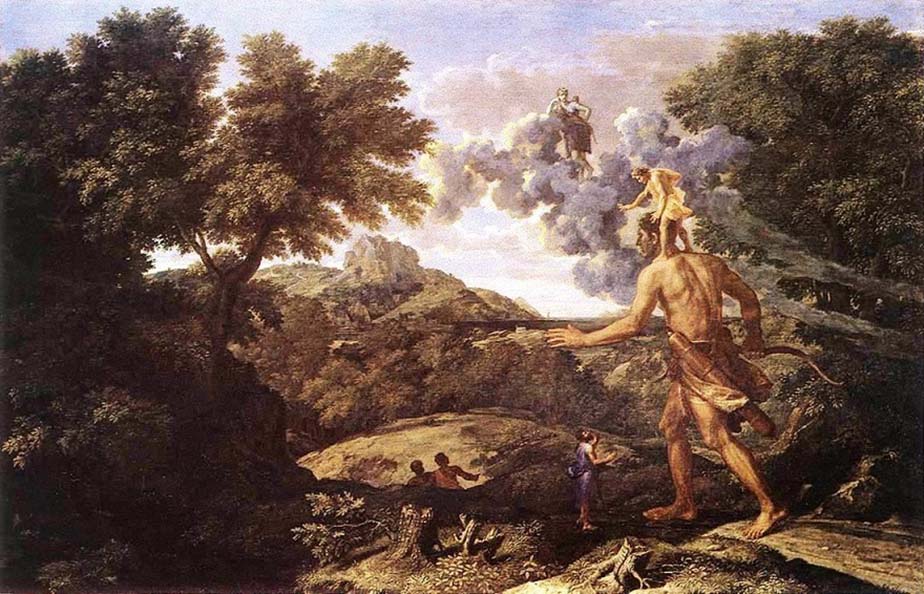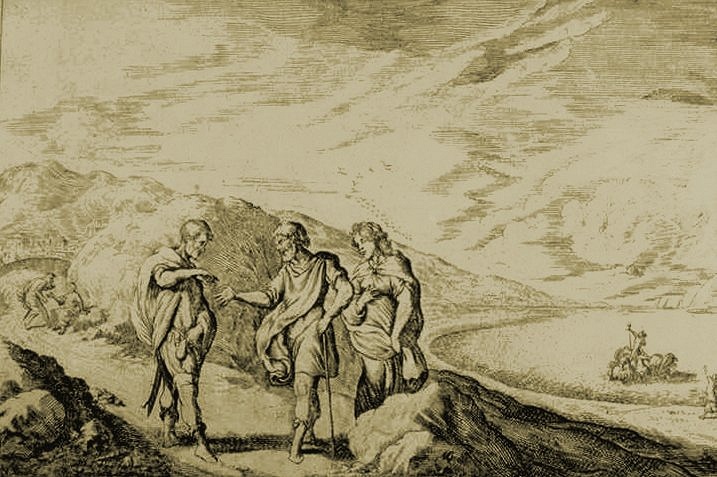Hyrieus
In Greek mythology, Hyrieus (Ancient Greek: Ὑριεύς) was the eponym of Hyria in Boeotia, where he dwelt and where Orion (see below) was born; some sources though place him either in Thrace or on Chios.
One source calls him father of Crinacus. Most accounts speak of him as a king, although Ovid and Nonnus portray him as a peasant.
Treasury
According to Hyrieus story, Hyrieus would build, and rule, the city of Hyria in Boeotia, which of course was named after Hyrieus.
Hyria under Hyrieus would prosper, and gold flowed into the royal palace, and so Hyrieus decided to build a secure treasure house for his gold. To this end Hyrieus employed the noted architect brothers Agamedes and Trophonius, who had already constructed Apollo’s first temple at Delphi.
From outward appearances, Agamades and Trophonius did a good job building a secure building, but Hyrieus did not know that the brothers were not to be trusted. For the pair had built a secret entrance to the treasure house, and by moving just one stone, the brothers had access to all the treasures stored within.
Time after time Agamades and Trophonius entered the vault, stealing a little each time, but Hyrieus noticed that his treasure was decreasing in size when it should be growing. The seals though always remained intact, and so Hyrieus installed various traps inside the treasure house.
One of these traps caught Agamades, and Trophonius was unable to release his brother, recognising that if Hyrieus found Agamades in his vault then suspicion would immediately fall upon Trophonius, Trophonius did the only thing he could do hide the fact, and cut off his brother’s head, leaving nothing behind that Hyrieus could recognise. Trophonius would shortly afterwards disappear into the earth.
Orion
Some speak of Hyrieus as Orion's natural father; others relate that he was childless and a widower and became (technically) adoptive father of Orion via the following circumstances.
He was visited by Zeus and Hermes (some add Poseidon as well), who, to express gratitude for his hospitality, promised him to fulfill a wish of his; he said that he wanted children.
The gods filled a sacrificial bull's hide with their urine (or sperm), then told Hyrieus to bury it. Nine months later, Hyrieus found a newborn baby boy inside and named him Orion; Roman authors thought of the Latin word urina "urine" as an etymon for Orion's name (though actually his name is obviously not of Latin origin).
Nonnus, on account of this story, refers to Orion as "having three fathers" and to Gaea (Earth) as his mother.
Some tell of Hyrieus becoming a father naturally afterwards; and by Clonia, the Naiad nymph of the fountain of Hyria, Hyrieus would become father to two sons Nycteus and Lycus, two sons who would both later become regents of Thebes.
It has to be said though, that other parentage of Nycteus and Lycus is given in Greek mythology, with some calling them sons of the Spartoi Chthonius, or perhaps sons of Poseidon and the Pleiad nymph Celaeno.
Other myths
Hyrieus was said to have expelled Euonymus from the temple of Apollo (Corinna, fragment 1). Maybe, this myth is related to the following fact:
The spindle's botanical name, Euonymus, is from the Greek "eu", meaning "good" and "onoma", meaning "name". This is said to have meant "lucky".
However, in some areas, it was also thought that if the spindle flowered early, an outbreak of the plague was on the way; not to mention the fact that both the leaves and fruit are toxic to humans – the berries having a laxative effect.

Sources
Strabo, Geography, 9. 2. 12
Hyginus, Fabulae, 195; Poetical Astronomy 2.34
Scholia on Homer, Iliad, 24. 544
Ovid, Fasti, 5. 499
Nonnus, Dionysiaca, 13. 97
Pseudo-Apollodorus, Bibliotheke 3.10.1; cf. 3.5.5, which calls the father of Lycus and Nycteus Chthonius ("earthman", one of the Spartoi)
Pausanias, Description of Greece, 9. 37. 5–6
Antoninus Liberalis, Metamorphoses, 25
Ovid, Fasti, 5. 493 - 536
Nonnus, Dionysiaca, 13. 96 - 105
Corinna, fragment 1 (ed. Page)













